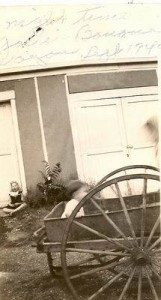Naked Celebrities and the Academic Value of Facebook
 The release of hundreds of photographs of naked celebrities has raised concerns about digital technologies. While criminal investigations are pursued and celebrities are asking individuals not to download the photographs, some commentators are rightly arguing that “if you don’t want people to see your naked selfies, don’t take them.”
The release of hundreds of photographs of naked celebrities has raised concerns about digital technologies. While criminal investigations are pursued and celebrities are asking individuals not to download the photographs, some commentators are rightly arguing that “if you don’t want people to see your naked selfies, don’t take them.”
In the mid 1930s, Fritz Mandl is reported to have spent more than $280,000 to purchase all of the copies of Extase (1933) which included nude scenes of his wife Hedy Lamarr. He was not successful and the film—as well as screen captures of the scenes to which Mandl objected—can be easily found and downloaded from the Internet. Mandl might have had some hope that he could purchase all of the copies of his wife’s first film. Today’s celebrities have no such hope.
While discussing naked celebrities last week and the inability to control material once it is released on-line, I stressed an equally important point—that social media such as Facebook is a valuable technology that makes me a more rounded person and better professor. Similar benefits, I pointed out to my students, are also available to them.
Because search engines are designed to provide us the same types of information we have previously read, confirmation bias becomes a serious problem when getting information online. Facebook has the potential to help us to overcome confirmation bias.
My Facebook friends come from a variety of political, socio-economic, and religious backgrounds. Because of their postings, I am exposed to a wide variety of worldviews. I don’t always agree with their postings and, sometimes, I shake my head that anyone could really believe such nonsense. But my understanding of different approaches to the world benefits me both in my personal life and while fulfilling my academic responsibilities.
Periodically, I read a Facebook posting that states, “The next time someone posts such-and-such, I am going to unfriend him or her.” This is a mistake if you want to avoid confirmation bias. I strongly object to some of the views expressed by Facebook friends, but whether I agree or not, such views are part of the public discourse. I am better off knowing what is being argued. I have only once unfriended someone; an individual whose vulgar postings were laced with racist and homophobic terms.
Facebook also benefits me because my friends read different publications than I do and post articles from those publicatons. Karen Shield Finlayson is interested in music and science and also reads the British Broadcasting Corporation (BBC) news. She shared Paul Rincon’s “Neandrathal ‘Atwork’ Found in Gibraltar Cave;” an article that exemplifies a point I had just made in my ancient world history class concerning the fact that–although history doesn’t change–our understanding of history changes with new discoveries. I cited the article in my next class and suggested that my students read it.
I depend on Bob Czuprynski to post articles from the New York Times and the Wall Street Journal. Jesse Stommel keeps me informed about Hybrid Pedagogy and related issues. Roger Whitson introduced me to Steam Punk as well as a variety of other esoteric topics. Sally Web educates me about theater. Glenn Sunshine keeps me informed about Christians being persecuted in Syria and other places; an important issue that I would likely not follow as closely were it not for his posting.
Dan Duso and other friends periodically post links on my timeline that they think will interest me and my students. Dan likes how I approach my classes and wants to be part of helping students develop their critical thinking skills.
I have friends who frequently post in languages I do not speak. A student could practice his or her newly developed language skills by communicating with Facebook friends from around the world.
Finally, a diversity of friends can yield pleasant surprises. On Labor Day, I posted an image of my great grandfather’s banana cart. I mentioned that “My great grandfather had been beaten so badly by strike breakers that he was unable to work. To make a living, he collected junk which he repaired and sold. How his cart received its name is unknown.” Less than an hour later, Eric Mattlin commented, “You may want to browse pictures of turn of the century (1900, not 2000) New Orleans. It looks very much like a fruit seller’s cart. So it may be called that because it’s original purpose was to get bananas from one place to another.”
Although they cannot be posted on Facebook, some individuals may consider access to photographs of naked celebrities to be one of the benefits of digital literacy. But social media is about so much more than being social. Along with the postings concerning cute cats and dinner choices is the ability to make valuable academic connections.
- –Steven L. Berg, PhD
Photo Caption: My great grandfather’s banana cart.
I agree whole hardheartedly. It’s been said Facebook is just one big bumper sticker, and I think it is true enough. But, as Steven points out can and is some much more. I wish it was more open than it is now. I keep mine open because there really is an unbelievable amount to share learn and talk about, even if we don’t agree. It really is about sharing and we should not forget it helped support a few government changes and revolutions. NSA aside there is real power here and a great tool.
Or maybe it is just about cats!